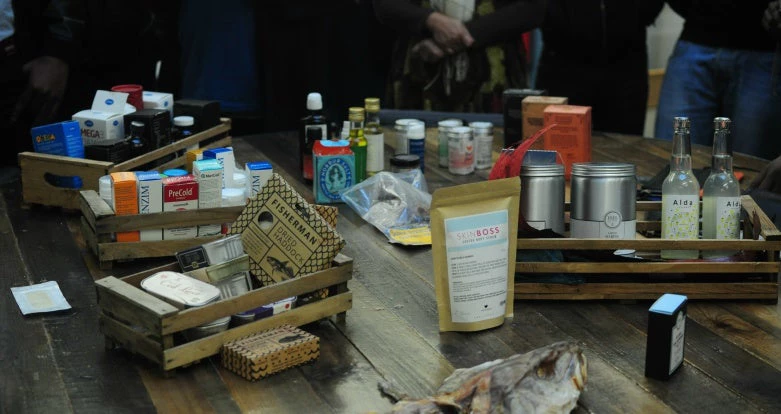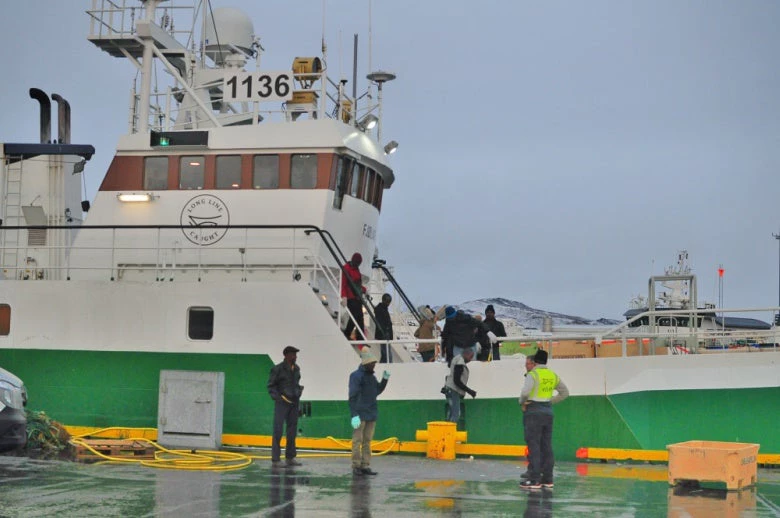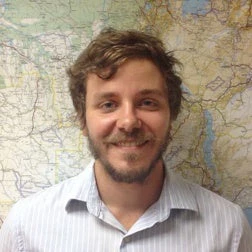
From Mozambique’s white-sand beaches to Iceland’s snow-white ports, a fisheries delegation learns how private rights, transparent management, and data analysis can transform a fishing industry.
The land and sea were blanketed in white when our flight touched down in a wintery Reykjavik. For many in the delegation from Mozambique’s Ministry of Sea, Inland Waters and Fisheries—here to learn about cutting-edge developments in fisheries management—it was the first time they had seen snow. As we slipped and skidded our way across icy sidewalks to Iceland’s Directorate of Fisheries in makeshift winter clothing, it was hard to believe that only 24 hours ago, we had been enjoying Maputo’s warm sunshine.
“How can anyone fish in this weather?” one of my colleagues exclaimed, pulling his hat down against the frigid air.
“Perhaps because it is so hard, they can charge a lot for the fish, that’s why they make so much money here,” someone replied, his voice muffled beneath the layers wrapped around his neck.
But, as the week progressed, we came to realize that Icelandic fishing isn’t as difficult as we imagined, at least not in the modern era. A look back at the country’s fishing history tells a different story.
These days, Iceland’s abundant commercial fisheries stocks are prospering and, since it doesn’t take a huge effort to bring in a good catch, fuel and operational costs are kept to a minimum, not only increasing profits but reducing the industry’s carbon emissions.
Our Icelandic colleagues reminded us more than once, though, that life in the fishing industry hasn’t always been so good.
Throughout the second half of the 20th century, Iceland’s cod industry was troubled by high mortality, declining stocks, and limited profitability. Then, when the cod populations responsible for more than a third of the value of the sector diminished, there was strong support for excluding foreign fishing vessels from Icelandic waters. From the 1950s through to the 1970s, a series of international disputes over fishing rights in the North Atlantic resulted in the so-called “Cod Wars,” and the establishment of a 200-nautical-mile Exclusive Economic Zone (EEZ) around a country, a distance not considered as UN standard until 1982.

Foreign vessels not the only problem
While the new EEZ curbed exploitation by international fishers, lack of oversight in the domestic sector meant that over-fishing continued. According to government officials and members of the private sector and academia, the mentality of people in Iceland’s fishing industry didn’t change until a quota system was introduced in the early 1980s.
Under this system, each fishing boat is assigned a permanent quota, limiting the share of fish the vessel can catch over time. This translates into annual quota shares, calculated as a percentage of the allowable catch for each year. To make this system financially attractive to the fishers, both the permanent and annual quota shares function as private property rights and can be traded. When coupled with regulations to promote efficient resource allocation and prevent speculative behavior, these tradable shares incentivize long-term thinking and sustainable behavior.
From Mozambique’s perspective
Coming from Mozambique, where the over-exploitation of fisheries is of increasing concern and the need for a more equitable and sustainable system for managing ocean resources is desperately needed, Iceland’s quota system seems an attractive solution. But, as our hosts were quick to point out, the benefits of quotas do not emerge by magic.
At meeting after meeting, we were told that there were three, key elements to success: (i) the in-depth analysis of biological, administrative, and economic data; (ii) complete management transparency; and (iii) an effective, risk-based monitoring, control and surveillance system.
On a visit to the fishing town of Grindavik, 50km south of Reykjavik, the capital, we were able to experience the advances in data analysis, transparency and monitoring Iceland has made. After spending the afternoon admiring the majestic Fjölnir GK-157 longliner vessel, owned by the fishing company Vísir, we returned to the Directorate of Fisheries in the Ministry of Industries and Innovation to see how it monitored its catches.
On the Directorate’s website, we were able to find exact information on each vessel’s catch by species, port, and date. The day we visited Grindavik, our beautiful Fjölnir GK-157 had delivered 53 tons of cod and 17 tons of ling just hours before we went aboard.
While we were busy admiring the ease of retrieving this information, our Icelandic counterparts were emphasizing the importance of industry-oriented research, development, and innovation, such as the work they are doing with the software and machinery developer Marel, with academic and knowledge communities like MATÍS, and with research incubators such as the Ocean Cluster.
Leaving behind Iceland’s sub-zero temperatures, we returned home bursting with ideas about the potential of Mozambique’s fishing industry.
Iceland had provided us with a strong idea of how private rights can reduce exploitation and lead to better stewardship of ocean resources. We saw firsthand what a combination of strong management; extensive and transparent data; and collaboration between researchers, decision makers, and communities can do for sustainable economic growth within the fisheries sector.
Iceland offered us a vision of what Mozambique can become, but I don’t think any one of my colleagues would trade our warm waters for those of the ice-filled North Atlantic.
The delegation visited Iceland between Nov 26 and Dec 2 2017. The Mozambican delegation was comprised of ten staff from the Ministry of Sea, Inland Waters and Fisheries (MIMAIP), joined by a World Bank staff member. The visit would not have happened without André Aquino’s and Xavier Vincent’s support on the World Bank side. A special thanks to Brynhildur Benediktsdóttir, Arnór Snæbjörnsson, Þórarinna Söebech and Tumi Tómasson, who ensured flawless organization and logistics during the delegation’s time in Iceland.


Join the Conversation